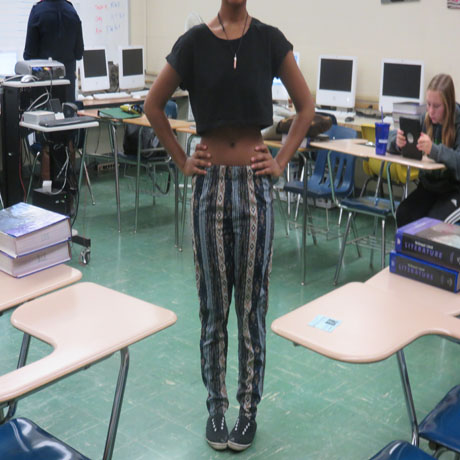VS: Breaking the Code
Alexandria Montgomery’s Journey to Deconstruct the Dress Code

Inappropriate Dress?
November 6, 2014
I’m on a journey to change our dress code.
For ten days straight, I broke the code: I wore crop tops, strapless shirts, and spaghetti straps. Every day without fail, I was called down to the athletic office where I was inspected head to toe for any violations. I would then be handed the Bag of Shame to sift through. I’d pick some God-awful wrinkled, stale smelling shirt and change. This daily process unfolded, of course, after I debated (challenged, argued, whatever) my way up the hierarchy. Of course, there was no avail in, what I thought to be, pretty solid arguments. I was threatened with Saturday Schools and detentions, but the most I received was a seemingly eternal grimace.
Why go through this daily process? Why subject myself to the eternal grimace? Why deal with the Bag of Shame, day after day after day?
My qualms with the dress code reside in the politics: the way it is publicly enforced, its implied attitudes, and its values. Often in middle school and high school, young girls are publicly shamed by authority figures for their dress and told blatantly that their bodies are a distraction to boys. Other times, these young women are told that strict dress codes are preparation for the professional world.
First, by publicly telling young and impressionable women that their bodies are distractions, we are instilling a feeling of uneasiness within them when it comes to their bodies. Suddenly, their bodies are an object under a microscope for boys and grown men to critique or be distracted by. We are teaching these young ladies to be ashamed of themselves. In addition to our young women being taught to be ashamed, we are simultaneously teaching our young and impressionable men that it is acceptable to objectify, sexualize, and critique the female body. Publicly excusing the shaming of these girls by saying it is preparation for the professional world tells young men that in the professional world, the woman is inferior because her attire and body are the scapegoat for a man’s behavior.
This attitude of superiority in men and inferiority in women manifests in our society in many ways, two of the most prevalent being rape culture and slut shaming. Rape culture is anything in society that trivializes, normalizes, or eroticizes rape and sexual assault or the reactions and attitudes associated with these events. Robin Thicke’s song, “Blurred Lines” explicitly condones taking advantage of a female despite her consent. The message is subtle, but definitely present. In the much publicized Stubenville rape case, the victim was blamed for casting a harsh light on her school’s football team and town, while her rapists (yes, multiple boys were charged with the rape of a minor) received far less public reproach and far more public sympathy. That is rape culture: her rape was obviously trivialized and treated as a “rite of passage” rather than a crime.
Slut shaming is, essentially, the act of criticizing a female for supposed promiscuity. Girls are often labeled sluts because of their dress, which I see as a term of subjugation; these men (and women) using this word are using the slanderous term and its negative connotation to push her back into the mold our culture has formed for her. The “slut” is shamed into silence by peers and superiors alike. Rush Limbaugh calling Sandra Fluke a whore for, essentially, being an advocate of birth control, is slut shaming. Since when does wanting to have safe sex totally equates in promiscuity?
Both rape culture and slut shaming stem from the ideas instilled in boys and girls during high school. Because females are not allowed to dress in a way that could distract boys, we are teaching the boys entitlement, which is a characteristic of rape culture. Our men are also taught that it is okay to shame the female body, because body shaming is also normalized in high school. This is a characteristic of slut shaming.
I believe the prevalence of rape culture and slut shaming in our society stems from the attitudes and values taught with high school dress codes.
I’m not the only young woman who feels this way. Young girls across the globe are fighting the policies that promote the objectification of their bodies and the suppression of their sexuality. In Quebec, 15-year-old Lindsay Stocker began a protest after being called out on her short skirt in front of her peers. In Florida, 15 year old Miranda Larken was forced to wear a shame suit in front of her peers because, according to her school’s administration, her skirt was too short. When interviewed, she said: “Too often, dress codes are less about making students appear professional and more about singling out young women (especially those who are more developed), treating their bodies as sexual objects with the potential to force boys to misbehave.”
I truly believe the way the female and her body are regarded in society is an issue. Dress codes are an even larger issue that need to be reformed and reevaluated. Our handling of gender, power, and sexuality say a lot about us as a society, and the message being sent isn’t a good one. This all begins here.




Jane Doe • Dec 11, 2014 at 8:06 pm
While I do think some things about dress code need to change, ie guys with shorts that show their whole sides etc I don’t think having girls dress respectfully is a bad thing. It’s one thing to wear a crop top out with friend or to the beach but school is a not a place to show off your body. It’s a place to learn. I for one feel unfortable when girls have shorts that are too short because I feel like I’m seeing something I shouldn’t see. Dress code is in place to protect the students. As a public school we have people from all backgrounds going here and some were raised believing showing too mich skin is disrespectful to ones body. I am comfortable in my own skin. But I also don’t feel the need to show everyone all of it.
Macey Diane • Dec 8, 2014 at 2:14 pm
Very well said
anonymous • Dec 5, 2014 at 10:36 am
I am a girl and I do not care to see other girls’ stomach’s during school. Or guys’ underwear. I do not come to school to stare at people like that. Therefore please don’t wear it. Yes it is a distraction and it’s annoying! It’s school not a fashion show! Have some respect for your own body!
Anonymous • Nov 15, 2014 at 10:06 pm
Let me first just say, a dress code is NOT sexist or any form of shaming. You think you’re hot? You like your body? That’s great! No one is telling you not to! But in school at professional settings, you were not meant to have everything out in plain sight. You know why? Because your purpose for being there is to work, not show off your body. And frankly, this is not just a distraction to boys. I am a female and frankly I do not want to see your boobs during class. I’ve seen you wear thin, low cut shirts with no bra, and it’s not the time or the place for it. Instead of acting as if you’re above society, try ACTUALLY opening your mind and realize some rules are there for a reason.
Anonymous 2 • Nov 14, 2014 at 10:42 am
How is this a deconstruction? Seriously rape culture, slut shaming? No, these have nothing to do with our dress code. This is about your sexist views against men and your using this as an outlet to publicly state your opinion. What you need is a reality check because maybe then you will understand that we have a dress code because it’s what is publicly acceptable, and you know what? I will bet that women who live in the mans world were the ones who had respect for themselves and didn’t have crop top issues in high school, but keep telling yourself other wise because I know it won’t get you far in our society. Oh! Good job at using big words to get your biased, sexist views across.
Anonymous • Nov 14, 2014 at 9:30 am
Honestly if you hate the dress code that much then get home schooled
Hannah Hapner • Nov 14, 2014 at 8:11 am
I read part of this article when she was writing it and was extremely impressed. The ideas she represented and touched on were extremely insightful and I wasn’t expecting such insightfulness from a high school student. Very, very we’ll done.
Meghan • Nov 6, 2014 at 12:15 pm
I am so impressed with this article – it is well thought out, and explains rape culture, not only in a way that is easy to understand, but in such a way thay the dress code can clearly be seen as perpetuating it. I would love to see a radical reworking of the dress code to remove the bias against young women. For instance, I’ve seen guys in basketball shirts with their entire side visible – if half as much skin were visible in a girl, she wouldn’t have made it through her 1st period class. Automatically sexualizing visible skin in girls and not boys is sexism, plain and simple. And while our society encourages it, I would appreciate our learning environment being above such bias.